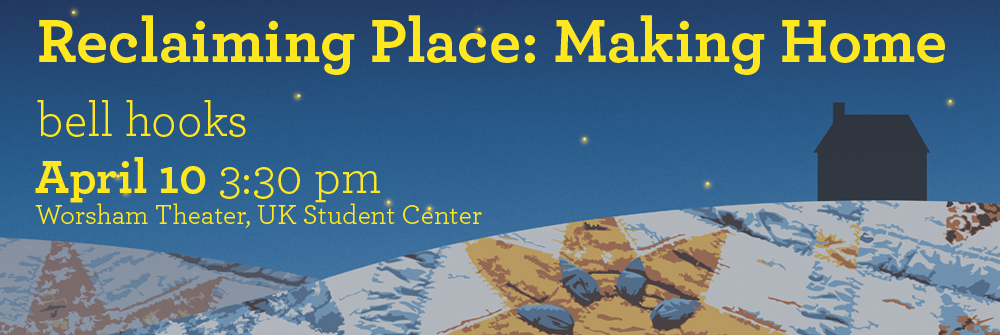bell hooks spoke yesterday at the University of Kentucky as part of the “Place Matters” series (I blogged about one of the earlier talks in this series here). Her talk was entitled “Reclaiming Place: Making Home” and it highlighted the challenges and joys she’s encountered in moving back to Kentucky. She was born and raised in Kentucky, but left at 17 to go to Stanford and planned never to return. She said she thought there was a certain spice in her writings throughout her career that was the spice of Kentucky, but that largely her reviewers never acknowledged a sense of place in her writing.
A few years ago, she returned to Kentucky, not to her hometown of Hopkinsville, which she still associated with racial apartheid and gender oppression, but to the small town of Berea, home of Berea College. When she purchased a home in the Kentucky hills, she remembered her early years and how the one place she was not constantly aware of race was out in nature. But some of her siblings refused to visit her, remembering the attacks they’d experienced as children in similar hills. When she wanted to remodel her home, she asked the previous owners for the contact information of the builder. They gave it to her, but warned her that he may not want to work with “a Negro.” She went ahead and contacted him and he was fine (although a redneck, as she called him). He laughed when she told him the story of what the previous owners said, and told her that he had many black friends because he had been in prison in Georgia as a young man and most of the inmates were black. She realized that she had had racial and class-based expectations of this man when in reality the upper-class white folks had been the prejudiced ones.
hooks has started to write more about her return to Kentucky, African Americans relationship with space and the land, and sustainability. Her most recent book, Belonging: A Culture of Place, did not sell well. She suggested that it was because it was about Kentucky and land, instead of the race, class, and gender dialogue that a white supremacist culture expects her to write about.
hooks is also starting to focus on the ideology of love. She talked about the problem with a binary culture that will only let her be one thing. People think she has changed because she has started to focus on love, whereas she would claim it has been present in her writing for a long time. Also, there is the strange fact of white readers embracing All About Love without recognizing her more strident critiques of white supremacy and patriarchy.
[As a blog post I should tell you what I thought of the lecture, instead of just summarizing it, but I gotta run to an appointment and I wanted to get this up. I look forward to hearing your thoughts in the comments.]



3 Thoughts on this Post
S-USIH Comment Policy
We ask that those who participate in the discussions generated in the Comments section do so with the same decorum as they would in any other academic setting or context. Since the USIH bloggers write under our real names, we would prefer that our commenters also identify themselves by their real name. As our primary goal is to stimulate and engage in fruitful and productive discussion, ad hominem attacks (personal or professional), unnecessary insults, and/or mean-spiritedness have no place in the USIH Blog’s Comments section. Therefore, we reserve the right to remove any comments that contain any of the above and/or are not intended to further the discussion of the topic of the post. We welcome suggestions for corrections to any of our posts. As the official blog of the Society of US Intellectual History, we hope to foster a diverse community of scholars and readers who engage with one another in discussions of US intellectual history, broadly understood.
If you’ve got time, I’d be glad to hear more of what she says about love.
I left my notes at home, but I will reply later. Thanks for your interest!
She talked about the difficulties, as well as importance, of bonding across difference. That it has to be worked at. The will to connect and find spaces of commonality. One of the first lectures she gave at Berea was about Cosmopolitanism, using the book by Kwame Anthony Appiah. A place in America of true cosmopolitanism, of talking across boundaries, is Wallmart. There’s a freedom to communicate about food.
She talked about the give and take of Berea, of knowing when the food banks are in distress. About how whites say there are no black folks in Berea, but she finds them at the Salvation Army. Living locally allows her to exercise a far more connected philanthropy. It involves not have power over, but sharing of the power. She advocated giving directly to people you meet in little and big ways, rather than depending on the rich to do all the philanthropy.
Spirituality gave her the realization that she is always more than any identity imposed on her. It honors places of mystery and lets her be more than a victim.
Activism should be rooted in love, not anger.
We need to recognize that Kentucky is our place and the US is our home. African Americans need to stop denying this (in her words).
That’s more of what she said, though perhaps not so directly about her philosophy of love.